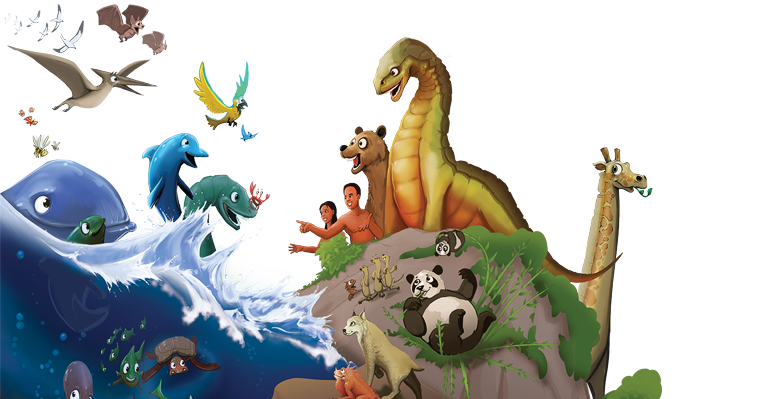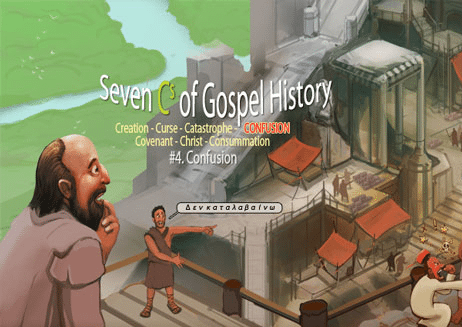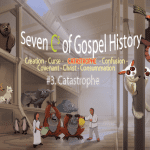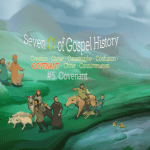
After the Flood, Noah and his family were the only people alive on the earth. God told them to have lots of children because he wanted their descendants to spread out and live all over the earth. So Noah’s family had lots of children, who had lots of children, who had lots of children, and so on. After a while there were hundreds, and then thousands of people. They moved from the mountains of Ararat, where the Ark had landed, to a broad plain called Shinar. But none of them wanted to obey God’s command to live in other parts of the earth.
A tower with its top in the heavens
Instead, they said to each other: “Come on! Let’s build a city for ourselves with a tower that reaches way up into the sky, to make a name for ourselves, and so we won’t be scattered over the earth.” They used clay to make bricks, which they baked in ovens to make them hard and strong, and they used tar to stick the bricks together. Up, up, up went the tower, higher, and higher, and higher. God saw what they were doing, and He knew why they were doing it, because God knows everything. What could He do?
At that time everyone spoke the same language—that of their ancestor Noah. So, one day, God caused people to start speaking in different languages. Suddenly, it was impossible for people in one family to understand what the people in other families were saying. And so it was impossible for them to continue building their city or their tower.
Families and those people who could understand each other gathered together into groups. Then each group set out—north, south, east, and west—to get as far away from all the other groups as possible. In this way, God not only judged the people for their disobedience to Him, but He also caused them to want to scatter over the face of the earth. Wow! Whatever God wants to happen, He can make happen—very easily and no one can prevent it.
The city came to be known as Babel. The word ‘Babel’ sounds like the Hebrew word for ‘confused’. In English, we could say that God made a ‘babble’ of the languages the people now spoke.
Did today’s languages all begin in Babel?
Languages change as people add new words or give new meanings to words. Today there are about 7,000 languages. These can be grouped into a dozen or so different ‘language families’. For example, there is now the Indo-European language family, and the New Guinea language family, and the Australian Aboriginal language family, and so on. These language families are nothing like each other, but there are many similar languages within each family. All languages in a family probably descended from one of the languages God created at Babel. These Babel languages have multiplied into the 7,000 languages in the world today.
Evolutionists have great difficulty in accounting for the rise of languages from any supposed animal ancestor, as the theory of evolution requires. Animals communicate by the sounds they make, by their facial expressions and body postures, and by their odors, but they don’t use sentences as we do.
They especially can’t understand the way we combine small parts of language into larger parts. For example, even the smartest chimp can’t understand, “The man saw the boy give the book to the girl,” although you can very easily. That’s because the part “boy gives book to girl” is contained within “the man saw”.
Why is there such a big difference between humans and animals? Because we are made in the image of God, and God has given us, but not animals, the gift of speech. This is not only so we can talk to each other, but also so that we can speak to God in prayer. Did you know the Bible says that the prayer of the upright is God’s delight (Proverbs 15:8)?

Why are people all over the world so different?
The different groups of people moving away from Babel not only spoke different languages, they would also have had different features like dark or light skin, different eye colors, and so on. Dark skin is due to a pigment called melanin. We all have some of it; dark-skinned people simply have more of it than light-skinned people. People with darker skin are less likely to suffer sunburn and skin cancer, and so survive better in the tropics. People with lighter skin survive better in cooler climates.
But is this ‘evolution’, where new features arise that weren’t there before? No, God made our first parents, Adam and Eve, already programmed with the instructions, called genes, for these features. They had some genes for making lots of melanin in the skin, and others for making small amounts. When people had both genes, they had medium-brown skin. But some of Noah’s descendants lost some of these genes. The dark-skinned people have lost genes to make small amounts of melanin, The light-skinned people have lost genes to make lots of melanin. In a big group of people, the genes would be unlikely to be lost, because someone would probably have them. But in a small group, there is a good chance of some genes being lost for ever.
People in each language group leaving Babel would also have tended to marry within their own group, and so preserve those qualities seen as beneficial to that group. Over time, this has resulted in the differences that make up the various people groups in the world today. Some groups would have had people more skilled at building. Probably these were the people who built the pyramids in Egypt and other places in the world, after they had settled there.
God’s written Word, the Bible, reveals the true history of the world. Part of this is the confusion of languages at Babel. This perfectly explains both the different language families and the many ‘races’ or people groups in the world today.







